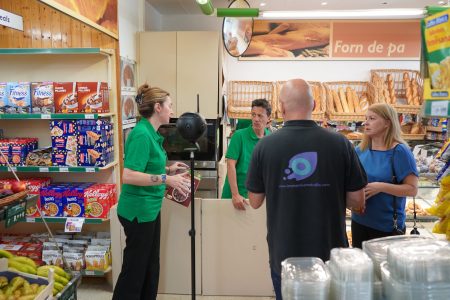The ITSHEC project (Integration of Transversal Skills into Health and Social Care, Higher Education and the Curriculum) is an international collaboration project between different universities and educational institutions. It is coordinated by the Universitat Pompeu Fabra and the Escola Superior d’Infermeria del Mar (ESIMar), the Metropolia University of Applied Sciences (Finland), the University of Split (UNIST, Croatia) and Immersium Studio participate in it. ITSHEC is co-funded by Erasmus+ and the European Union.

This project has been developed to work on Transversal skills, also known as soft skills, which are personal skills that go beyond technical knowledge and are based on adapting to changing environments. The project focuses on designing, piloting, and implementing teaching-learning strategies about the following main Transversal Skills: critical and creative thinking, autonomous learning, interpersonal-emotional intelligence, and citizenship competence. The objective of ITSHEC is the development of Transversal Skills in students of medicine, nursing, physiotherapy, social work and occupational therapy.
You can read more information about ITSHEC project in this post.
At ITSHEC we have developed educational teaching-learning strategies, incorporating highly rigorous pedagogical frameworks and innovative tools such as Virtual Reality. From Immersium Studio together with the collaboration of the other partners, we have designed three immersive experiences to work on each of the Transversal Skills. Below we will explain what each of the experiences consists of, and as it is a European project, all the material is available for free on the project website (www.itshec.upf.edu). These resources are used with Virtual Reality glasses (cardboard) that work with the mobile, where an application is downloaded and the contents can be viewed. You can consult here how to access all the Virtual Reality resources of the ITSHEC project.
Interpersonal and socio-emotional skills VR Learning Experience




In this experience, the user plays the role of a health professional attending a suicide attempt. You will need to communicate with other healthcare professionals, the patient, and the patient’s family who are unaware of the suicide attempt. The user’s decisions will determine the course of the experience, and they will receive feedback on each decision they make. They can also reverse decisions to compare the consequences of different decisions.
Learning to learn VR Learning Experience




In this experience, the user plays the role of a young doctor in the first residency years, accompanied by an experienced doctor. They are in a Health Center and there is also a nurse. The user has to try to solve any problems that may arise and evaluate when it is necessary to seek the advice of another professional to solve the difficulties that may arise. In the lobby there is a family (father and two children) trying to talk to the health administration. The boy seems dizzy and needs help. His sister is crying. The father ask questions the health administration in another language. It is necessary to decide the steps to follow to reach an understanding.
Creative and critical thinking VR Learning Experience




In this experience, the user assumes the role of a resident doctor who will be accompanied by another doctor, who will be in charge of supervising the decisions they make. A 14-year-old student arrives in an ambulance with his teacher, who dislocated his ring finger during physical education class. Once the radiological study has been carried out and the simple dislocation has been treated, it is discovered that the child also presents symptoms of malnutrition, is neglected and his clothes are in poor condition.
We are very happy to be able to participate in European projects like this, where technology plays an important role in helping with a specific topic, such as immersive learning. The use of immersive learning through Virtual Reality improves skills, abilities and experience in an experiential way that allows users to experience situations in which they will find themselves in their professional development. Training through Active Learning allows them to practice and improve skills, make mistakes, learn and gain confidence when they face these situations in real life. Immersive learning multiplies content retention by 4, doubles empathy, and users learn content four times faster than with other types of training. We are convinced that new technologies have a lot to contribute in teaching and will be increasingly present in different fields.




